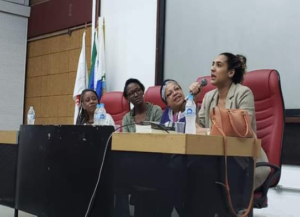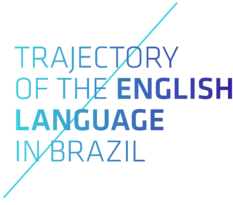Janaina da Silva Cardoso

The story of Janaina da Silva Cardoso is one of overcoming obstacles and fighting for equality and liberation. Her trajectory represents one of her great causes: the struggle for an emancipating English capable of functioning as an instrument of social ascension. She was the first black director of the Faculty of Letters at the State University of Rio de Janeiro (UERJ), and teacher of Anielle Franco, current Minister of Racial Equality and sister of Marielle, councillor of Rio de Janeiro, murdered in March 2018. Janaina sees education, democracy and representativeness as important pillars in the struggle for more inclusive language teaching.
Today a doctor, professor and university director, Janaina regrets that quality English education is not available to everyone. “The one who paid for my English course was a white person who we considered an aunt. If she hadn’t paid for English, I wouldn’t be here now (…) the English language opens doors to other studies, knowledge, cultures… That’s the good side of it. I would like everyone to have the same opportunity, but unfortunately it is not the case”, she says.
The importance of education was something that Janaina always believed. She learned from an early age, from her mother, that education transforms. “At home, my mother initially only had primary education. She finished her secondary education at the same time as I did. But we had a very strong cultural encouragement of ‘we need to get out of this here, we need to get out of this situation’. And my mother always said that it has to come from education. (…) I didn’t lower my head either, I just kept on, and I kept on”, recalls Janaina.
And she did keep on, until she became the first black director of the Faculty of Letters at the State University of Rio de Janeiro, one of the most respected institutions in the country. The election for the position of director was only possible thanks to the support of the students. “Even friends of mine thought I would not win the election. Each teacher vote is the equivalent of 11 student votes. (…) I didn’t win by teachers’ votes, as only 40% voted for our team. (…) It wasn’t just black women who voted, it wasn’t just women, it wasn’t just homosexuals, it wasn’t just indigenous people. It was a group of male and female students that said: ‘We want to be heard.’” says Janaina.
Even with the achievement, there is still prejudice and racism within the university. “Here at the university, they never think I’m a professor. Many times, they come and ask at the beginning of the class “Where is the professor?” There are approximately 160 or 170 professors in the faculty. But only ten are black.” reports Janaina.
The situation mirrors the non-acceptance of minorities in positions of influence. In this regard, Janaina says that “my colleague, Aparecida de Jesus Ferreira, who works with racial critical theory, carried out an experiment. She wrote “doctor” in Google Images to see when a black doctor comes up. She did the same with the words engineer and professor, to see the same thing”.
In Janaina’s view, English should be an empowering tool, capable of helping marginalised people have their voices and skills valued. Which would only be possible from a decolonial English perspective. “Everybody’s talking now, decolonial English and all. What happens is that we need to work for social justice. Paulo Freire was already talking about this, I don’t know how long ago. We still haven’t managed to get out of banking education.” Comments Janaina, referring to Paulo Freire’s criticism of an education based on the cold “deposit” of information from a teacher into the minds of students. To substitute this format called “banking education”, Paulo Freire advocated a liberating education, capable of valuing the student’s life and context. For Janaina, decolonial English has to be liberating.
In the context of the English language, the opposite of decolonial and liberating education would be a colonialist English, based on the “deposit” of unique learning models. “The judgement of ‘ah, you don’t speak English properly, you don’t speak it like a native’… Which is the ‘mutt complex’. For example, when you see advertisements promoting English classes with native teachers. This is a problem, as it perpetuates the idea that you can only speak English properly if you are a native speaker. (…) It is important to understand this, that we are not minors, that Brazilian English teachers have the same value as foreign teachers. And that each teacher brings their own unique baggage”, she comments.
To help put this vision into effect, Janaina believes that it is important to value the wisdom, experience and knowledge of black people. “We must listen to professor associations and universities, and we have to act in the government as well (…) we need more professors doing research, mainly involving black professors and women. These surveys need to be participatory and listen to all parties involved”.
In this sense, she believes that the participation of marginalised people in spaces of power can help to bring about this feeling of representation and acceptance of diversity, knowledge and practices considered official. “I met Marielle [Franco], I talked to Marielle and said to her ‘you can’t give in, you have to do a nice job, because you can’t go wrong’. And she didn’t make mistakes, but they killed her”.
The fight continues through other people, like Anielle Franco, Marielle’s sister and Janaina’s former student. Anielle was recently sworn in as Minister for Racial Equality. “I now have my student as a minister. She mentioned me [in her inauguration speech], and put me at the same level as Angela Davis, Carolina de Jesus and Conceição Evaristo. (…) I am very touched that Anielle is there. I always say ‘don’t forget where you came from. If you’re going to go up, don’t forget where you came from.”
 Anielle Franco shares with Janaina the understanding that decolonial English can serve as an instrument of social emancipation. Like Janaina, Anielle has a background in English. After her sister’s death, she created educational projects in which she democratised, among other knowledge, knowledge of the English language. The idea is to give opportunities to black girls from Rio’s favelas.
Anielle Franco shares with Janaina the understanding that decolonial English can serve as an instrument of social emancipation. Like Janaina, Anielle has a background in English. After her sister’s death, she created educational projects in which she democratised, among other knowledge, knowledge of the English language. The idea is to give opportunities to black girls from Rio’s favelas.
Janaina points out that it is important that people who are not heard, fight for their voice. And she sees English in an emancipatory perspective, as a tool for the conquest of dignity and citizenship. It was like that for her, and it was like that for Anielle as well. Suggesting the protagonism of the excluded does not mean removing responsibility from others. As Janaína explains, hoping for more democratic societies and the English language. “You don’t have to be black to discuss issues of racism, nor indigenous to discuss issues of indigenous peoples, nor homosexual to discuss homophobia, nor a woman to discuss gender issues. We need to discuss with our colleagues in general, to change and reduce prejudice”.

